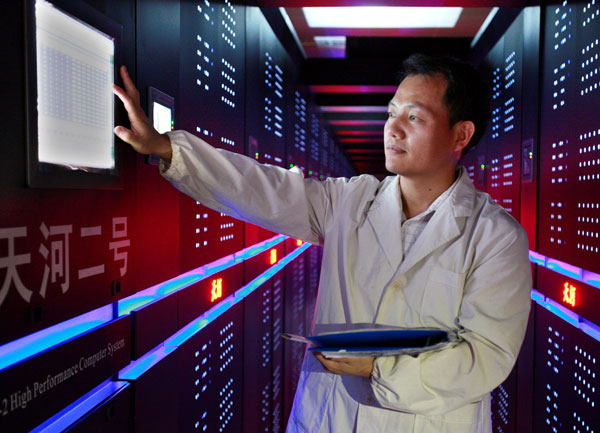China bytes back with fastest computer
Updated: 2013-06-18 02:23
By Pu Zhendong in Changsha (China Daily)
|
||||||||
China is back on top of the supercomputing world with the successful operation of Tianhe-2, the world's fastest computer.
A delighted Liao Xiangke, the 50-year-old chief designer, said his team's supercomputing dream will never rest.
 |
|
A technician checks the operation of the Tianhe-2 high performance computer system. HE SHUYUAN / FOR CHINA DAILY |
"Like astronauts' space dreams and sailors' aircraft carrier dreams, our supercomputing dream is part of the Chinese dream," he said.
On Monday, TOP500, an organization that evaluates high-performance computers worldwide, announced that Tianhe-2 was the world's fastest supercomputer.
It's ultra-high capability of 54.9 petaflops, or 54.9 quadrillion calculations per second, outshone competitors from the United States and Japan. It will provide an open platform for research, education and high performance computing services for southern China.
Jack Dongarra, the US supercomputing expert who compiles the TOP500 list, said there are a number of unique and interesting features of Tianhe-2, including the FT-1500 central processing unit.
Li Nan, deputy chief designer and spokesman for the Tianhe-2 project, said that of the many technological innovations on this "magic instrument", the FT-1500 is "his pride".
Supported by national funding and developed by the National University of Defense Technology, Tianhe-2 was built in just 15 months with a calculation capability 11 times its predecessor Tianhe-1A.
With a peak performance of 4.7 petaflops, Tianhe-1A headed the TOP500 list in November 2010, becoming the first Chinese supercomputer champion. Yet by the end of 2012, the leading position had been lost to the K computer from Japan, and the Sequoia and the Titan from the United States.
Global competition in high-performance computers is fierce, Liao said, and Tianhe-2, facing rivals from the US and Japan, may only keep its edge until 2015.
Li said the US still dominates the high-performance computing field, accounting for half of the top 500 supercomputers in the world.
"That's why nurturing our own supercomputing talent is so important," he said.

 Michelle lays roses at site along Berlin Wall
Michelle lays roses at site along Berlin Wall
 Historic space lecture in Tiangong-1 commences
Historic space lecture in Tiangong-1 commences
 'Sopranos' Star James Gandolfini dead at 51
'Sopranos' Star James Gandolfini dead at 51
 UN: Number of refugees hits 18-year high
UN: Number of refugees hits 18-year high
 Slide: Jet exercises from aircraft carrier
Slide: Jet exercises from aircraft carrier
 Talks establish fishery hotline
Talks establish fishery hotline
 Foreign buyers eye Chinese drones
Foreign buyers eye Chinese drones
 UN chief hails China's peacekeepers
UN chief hails China's peacekeepers
Most Viewed
Editor's Picks

|

|

|

|

|

|
Today's Top News
Shenzhou X astronaut gives lecture today
US told to reassess duties on Chinese paper
Chinese seek greater share of satellite market
Russia rejects Obama's nuke cut proposal
US immigration bill sees Senate breakthrough
Brazilian cities revoke fare hikes
Moody's warns on China's local govt debt
Air quality in major cities drops in May
US Weekly

|

|








